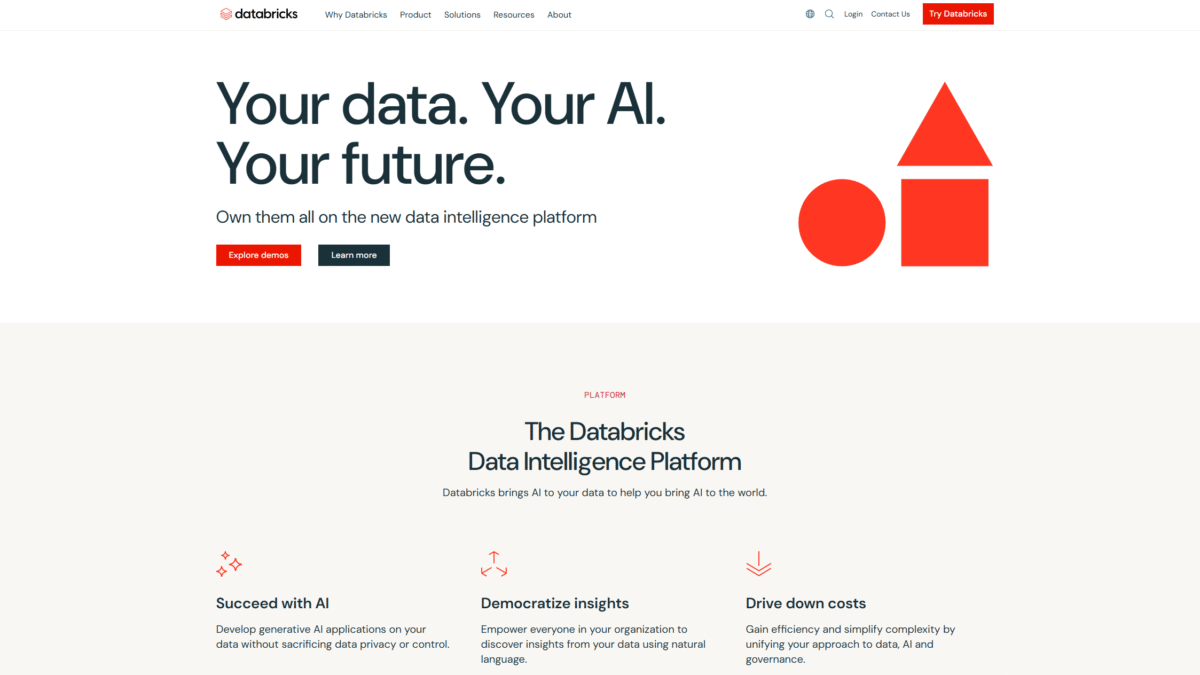
Unlock Big Data for Scalable AI and Smarter Insights
In today’s era of big data, organizations need a platform that can ingest massive volumes of information, keep lineage and quality intact, and drive AI models at scale. Databricks does exactly that by unifying data engineering, analytics, and AI workloads on a cloud-native, secure platform.
What is Databricks?
Databricks is a cloud-based Data Intelligence Platform designed to help enterprises build, scale, and govern data and AI workflows. It combines data engineering, data science, machine learning, and analytics in one unified environment, ensuring end-to-end lineage, quality control, and data privacy.
Databricks Overview
Founded by the original creators of Apache Spark, Databricks launched with the mission to simplify big data processing and unlock AI insights from massive datasets. Over the years, it has grown into a leader in data and AI, trusted by thousands of customers across industries such as finance, healthcare, retail, and manufacturing.
Key milestones include the introduction of the Lakehouse architecture to unify data warehouses and data lakes, the launch of Mosaic AI Gateway for model serving, and expansion into generative AI capabilities backed by integrations with Anthropic and Shutterstock ImageAI.
Pros and Cons
Pro: Unified platform that eliminates silos between data engineering, analytics, and AI.
Pro: Fine-grained, per-second pay-as-you-go pricing for cost efficiency.
Pro: Built-in governance, lineage, and security features to maintain compliance.
Pro: Native support for generative AI model training, fine-tuning, and serving.
Pro: Rich ecosystem of integrations for ETL, BI, and model monitoring.
Pro: Collaborative workspaces with notebooks, dashboards, and version control.
Con: Initial learning curve for teams new to Spark-based architectures.
Con: Costs can escalate without proper governance on cluster usage.
Features
Databricks delivers a comprehensive set of tools to power any AI or analytics use case on top of your data.
Unified Data Engineering
Build and run batch, streaming, and ETL pipelines with native integrations.
- Managed Apache Spark clusters
- Delta Lake for ACID transactions
- Job scheduling and automated retries
Generative AI Model Support
Create, tune, and deploy your own LLMs while preserving data privacy.
- Mosaic AI Foundation Model Serving
- Anthropic integration for safety-tuned models
- Experiment tracking and governance
Data Warehousing & SQL Analytics
Run BI workloads at petabyte scale with high concurrency.
- Interactive query performance
- BI tool integrations (Tableau, Power BI)
- Materialized views and query caching
Operational Database
Managed Postgres for serving application data with low latency.
- Automatic backups and scaling
- ACID compliance for transactional workloads
- Connection pooling and monitoring
Databricks Pricing
With flexible consumption models and no upfront costs, Databricks meets you where you are. Try Databricks for Free Today to evaluate the platform risk-free.
Pay-as-you-go
Per-second billing with no commitment. Ideal for unpredictable workloads:
- Data Engineering: $0.15/DBU
- Data Warehousing: $0.22/DBU
- Interactive Workloads: $0.40/DBU
- Artificial Intelligence: $0.07/DBU
- Operational Database: $0.40/DBU
Committed Use Contracts
Lock in usage levels across clouds for deeper discounts:
- 12- to 36-month terms
- Flexible across AWS, Azure, GCP
- Volume-based savings tiers
Databricks Is Best For
Whether you’re a data engineer, analyst, or enterprise team, Databricks scales to your needs.
Data Engineers
Leverage managed Spark, Delta Lake, and orchestration to build resilient pipelines.
Data Analysts & BI Teams
Run high-concurrency SQL queries and visualize insights without moving data.
AI/ML Practitioners
Experiment, train, and deploy models on secured data with built-in MLOps.
Enterprise Architects
Maintain centralized governance, cost control, and compliance across clouds.
Benefits of Using Databricks
- Speed to Insights: End-to-end workflows in one place.
- Cost Efficiency: Optimize spending with per-second billing and commitments.
- Scalability: Auto-scale clusters for bursty workloads.
- Secure Collaboration: Role-based access, encryption, and audit logs.
- Data Privacy: Keep data within your VPC and under your control.
Customer Support
Databricks provides 24/7 global support with SLAs for enterprise customers. You can open tickets via the console, chat with engineers, or escalate critical incidents through dedicated channels.
Beyond reactive assistance, there are onboarding specialists, architecture reviews, and training programs to ensure your team succeeds with big data and AI projects.
External Reviews and Ratings
Customers praise Databricks for its ease of use, performance at scale, and unified approach. On major review sites, it rates above 4.5/5 for data engineering, analytics, and machine learning.
Some organizations note a learning curve for Spark best practices and emphasize the need for strong cost-management policies. Databricks addresses these concerns with richer documentation, usage dashboards, and proactive spending alerts.
Educational Resources and Community
Databricks maintains an active blog, regular webinars, and a certification program. The community forum—Databricks Answers—hosts thousands of Q&A threads. You’ll also find open-source projects, example notebooks on GitHub, and user-group meetups worldwide.
Conclusion
In a world driven by big data and AI, choosing the right platform is critical. Databricks unifies data engineering, analytics, and generative AI in a secure, scalable environment. Ready to experience it yourself? Try Databricks for Free Today and unlock smarter insights without sacrificing privacy or control.
